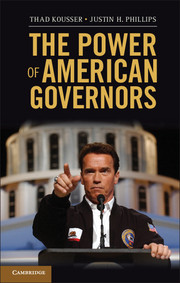Book contents
- Frontmatter
- Contents
- List of Figures
- List of Tables
- Acknowledgments
- 1 One Problem Shared by 50 Governors
- 2 The Roots of Executive Power
- 3 What Do Governors Propose?
- 4 Gubernatorial Success
- 5 Do Governors Set the Size of Government?
- 6 The Power and Perils of Popularity
- 7 The Item Veto A Negative or a Positive Power?
- 8 Legislative Professionalism and Gubernatorial Power
- 9 Governors and the Comparative Study of Chief Executives
- References
- Index
8 - Legislative Professionalism and Gubernatorial Power
Published online by Cambridge University Press: 05 November 2012
- Frontmatter
- Contents
- List of Figures
- List of Tables
- Acknowledgments
- 1 One Problem Shared by 50 Governors
- 2 The Roots of Executive Power
- 3 What Do Governors Propose?
- 4 Gubernatorial Success
- 5 Do Governors Set the Size of Government?
- 6 The Power and Perils of Popularity
- 7 The Item Veto A Negative or a Positive Power?
- 8 Legislative Professionalism and Gubernatorial Power
- 9 Governors and the Comparative Study of Chief Executives
- References
- Index
Summary
If states are to survive and prosper in our system, they need the tools of effective government. Proposition 1 -a is a giant step toward that goal. California can lead the way.
– B allot argument in favor of California's Proposition 1 -aIn 1966, California voters handily ratified a ballot measure that not only transformed their state's legislature from a citizen house into a professional body but also precipitated a decade of legislative modernization across the country. For California lawmakers, the passage of Proposition 1-a brought about a dramatic lengthening of legislative sessions, an increase in their salary, and the expansion of the legislature's expert staff. These reforms, part of a package proposed by the state's blue-ribbon Constitutional Revision Commission, were not intended merely to make life better for lawmakers. The proponents of the reform saw that it could transform state government more fundamentally. They understood that Proposition 1-a, by enhancing the effectiveness of the legislature, could alter the balance of power between the branches of government. Jesse Unruh, the speaker of the California Assembly and leader of the reform effort, argued that professionalization was needed because it would strengthen the hand of the legislature when it comes to dealing with the governor (Squire 1992).
On the eve of professionalization, however, not everyone was in agreement with Speaker Unruh. The information guide mailed to California voters prior to the 1966 election contained some surprising predictions at odds with our intuition about the effects of professionalization.
- Type
- Chapter
- Information
- The Power of American GovernorsWinning on Budgets and Losing on Policy, pp. 219 - 249Publisher: Cambridge University PressPrint publication year: 2012



